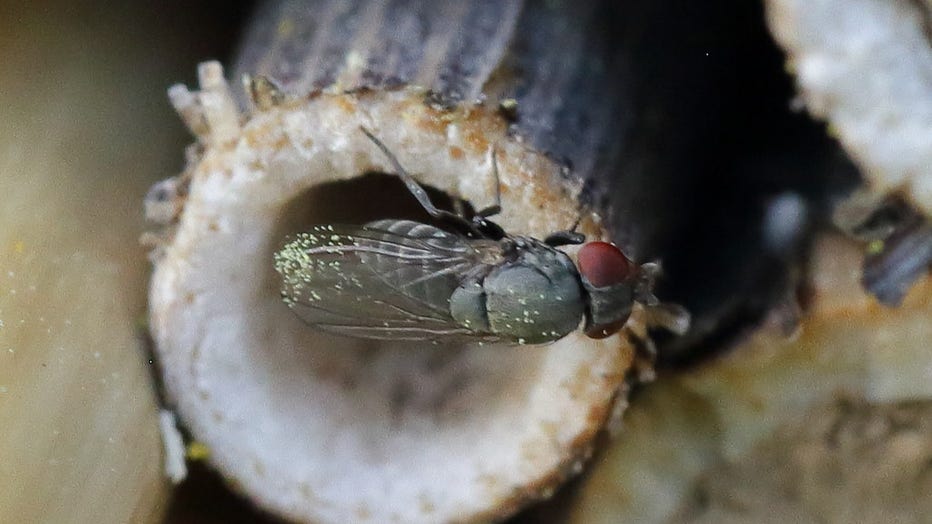Houdini Fly Hunt launched to protect native mason bees in WA, OR
BOTHELL, Wash. - An alarming threat to native pollinators has prompted a new nationwide initiative as Rent Mason Bees, based in Bothell, and researchers at the University of California, Davis have launched the Houdini Fly Hunt.
The campaign calls on citizen scientists and backyard bee hosts to help track sightings of the invasive Houdini fly — an aggressive parasite endangering mason bee populations across the Pacific Northwest.
Keep reading to learn more about the non-native parasite and what to do if you spot one.
A growing threat to native pollinators
The Houdini fly, a small gray insect with red eyes, was accidentally introduced from Europe and has been spreading in Washington and Oregon. It parasitizes mason bees by laying eggs in their nests. The fly larvae hatch and consume the pollen meant for developing bee larvae, ultimately starving the bees.
"I’ve seen a significant increase in Houdini flies in Washington and Oregon this year, and they are devastating to mason bee populations," said Abigail Lehner, a UC Davis PhD candidate leading the study. "Unmaintained bee hotels are a major cause of their spread."
Lehner recently secured a grant from the Western Sustainable Agriculture Research and Education (WSARE) program to study the Houdini fly’s biology and develop long-term management strategies.

Rent Mason Bees and UC Davis have launched the Houdini Fly Hunt to stop the spread of an invasive parasite threatening native mason bee populations in the Pacific Northwest. (Courtesy of Rent Mason Bees)
Responsible bee hotel care is key
Thyra McKelvie, managing director of Rent Mason Bees, says education and proper care are essential in preventing further infestation.
"Many people don’t realize that setting up a bee hotel comes with responsibility," McKelvie said. "Without proper maintenance, these hotels can quickly become breeding grounds for parasites like the Houdini fly."
To protect native bee populations, McKelvie recommends three key steps for hosts:
- Place clean, openable nesting materials in early spring.
- Remove nesting materials after the bee season (late spring).
- Harvest and clean cocoons in the fall to remove parasite.
"If you want to prevent further spread, it is imperative to clean out your bee hotel in the fall and remove Houdini larvae," Lehner added.
How to get involved in the Houdini Fly Hunt
The best way to stop the spread of the Houdini fly is by identifying where it’s taking hold. That’s where the public comes in.
Report sightings: Houdini Fly Hunt
Learn more: Watch how to spot the Houdini fly
The Source: Information for this story came from Rent Mason Bees.
MORE NEWS FROM FOX 13 SEATTLE
Seattle cruise season sets sail with record-breaking demand, big economic impact
First confirmed Pacific Northwest sighting of invasive Chinese mitten crab
Motorcyclist dead, 2 others injured in Pierce County crash
At least 11 dead after car plows into Vancouver, B.C. crowd
Tears, heartbreak at Chase Jones sentencing—teen in fatal Renton, WA crash
To get the best local news, weather and sports in Seattle for free, sign up for the daily FOX Seattle Newsletter.
Download the free FOX LOCAL app for mobile in the Apple App Store or Google Play Store for live Seattle news, top stories, weather updates and more local and national news.

